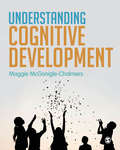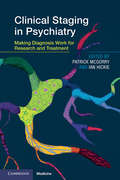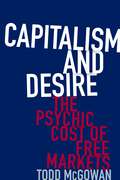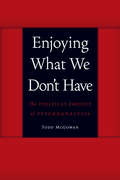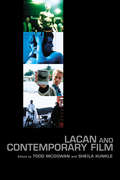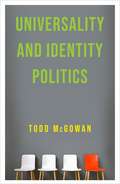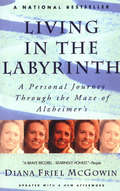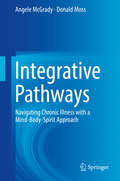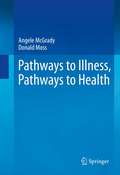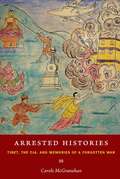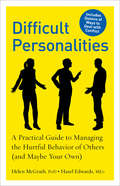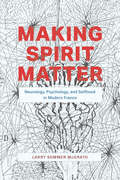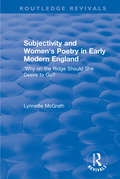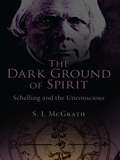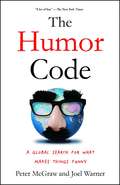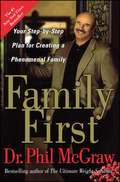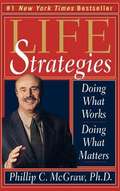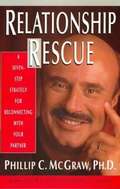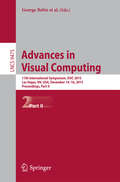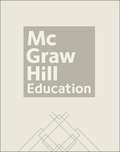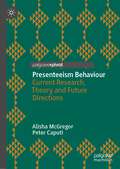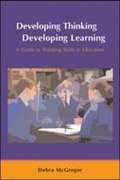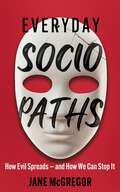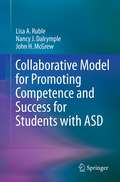- Table View
- List View
Understanding Cognitive Development (Discoveries And Explanations In Child Development Ser.)
by Maggie McGonigle-ChalmersUnderstanding Cognitive Development provides a fresh, evidence-based research perspective on the story of children’s cognitive development in the first ten years of human life. Starting with a brief survey of the key theoretical positions that have come to define developmental psychology, the textbook then focuses on the different cognitive abilities as they emerge throughout early development. Uniquely, it examines these in terms of their interdependence; that is how skills such as perception, memory, language and reasoning relate to one another. This holistic treatment allows students to see the many important intersections in this critical phase of human life development. This textbook employs a novel design that will be of immense help to both students and instructors and is intended to be read at two levels: at the first level, it provides a fully referenced explanatory account of experimental research on cognitive development with complete attention to the needs of students who have never been exposed to experimental methodology nor studies in cognitive development before. At the second level, and mapped directly onto numbered sub-sections within the text, the author uses illustrative panels designed along the lines of PowerPoint presentations to summarise studies and key findings, employing lots of pictorial material together with bullet-points to give vividness and texture to the material covered. These panels are replicated on the accompanying companion website in PowerPoint for lecturers and students to make further use of in teaching and revision. Revision points are provided at the end of every chapter. Rich in academic coverage, including a widespread database of the most important empirical research in the field, this textbook will be essential reading for students of cognitive development and developmental psychology across psychology and education.
Clinical Staging in Psychiatry: Making Diagnosis Work for Research and Treatment
by Patrick D. McGorry Ian B. HickiePsychiatric diagnosis is experiencing a crisis of confidence. Current approaches are outmoded with reform desperately needed. Clinical staging is a solution to this crisis. Clinical staging addresses the limitations of current diagnostic systems by recognising the full continuum or trajectory of mental illness from asymptomatic to chronic illness. It acknowledges the overlap between mental health symptoms during early stages and directly links each stage to treatment and underlying cognitive, neurological and biological changes. This approach enhances chances of early identification, promotes the implementation of safer treatments, and increases opportunities to alter the negative trajectory of mental disorders. This book comprehensively describes the conceptual basis of clinical staging in psychiatry, details current progress in identifying biomarkers for each stage, and explores the implications of staging on treatment and health systems. This book provides a foundation for transformational reform in psychiatric diagnosis.
Capitalism and Desire: The Psychic Cost of Free Markets
by Todd McGowanDespite creating vast inequalities and propping up reactionary world regimes, capitalism has many passionate defenders—but not because of what it withholds from some and gives to others. Capitalism dominates, Todd McGowan argues, because it mimics the structure of our desire while hiding the trauma that the system inflicts upon it. People from all backgrounds enjoy what capitalism provides, but at the same time are told more and better is yet to come. Capitalism traps us through an incomplete satisfaction that compels us after the new, the better, and the more.Capitalism's parasitic relationship to our desires gives it the illusion of corresponding to our natural impulses, which is how capitalism's defenders characterize it. By understanding this psychic strategy, McGowan hopes to divest us of our addiction to capitalist enrichment and help us rediscover enjoyment as we actually experienced it. By locating it in the present, McGowan frees us from our attachment to a better future and the belief that capitalism is an essential outgrowth of human nature. From this perspective, our economic, social, and political worlds open up to real political change. Eloquent and enlivened by examples from film, television, consumer culture, and everyday life, Capitalism and Desire brings a new, psychoanalytically grounded approach to political and social theory.
Enjoying What We Don't Have: The Political Project of Psychoanalysis (Symploke Studies in Contemporary Theory)
by Todd McGowanAlthough there have been many attempts to apply the ideas of psychoanalysis to political thought, this book is the first to identify the political project inherent in the fundamental tenets of psychoanalysis. And this political project, Todd McGowan contends, provides an avenue for emancipatory politics after the failure of Marxism in the twentieth century.Where others seeking the political import of psychoanalysis have looked to Freud&’s early work on sexuality, McGowan focuses on Freud&’s discovery of the death drive and Jacques Lacan&’s elaboration of this concept. He argues that the self-destruction occurring as a result of the death drive is the foundational act of emancipation around which we should construct our political philosophy. Psychoanalysis offers the possibility for thinking about emancipation not as an act of overcoming loss but as the embrace of loss. It is only through the embrace of loss, McGowan suggests, that we find the path to enjoyment, and enjoyment is the determinative factor in all political struggles—and only in a political project that embraces the centrality of loss will we find a viable alternative to global capitalism.
Lacan and Contemporary Film (Contemporary Theory Ser.)
by Todd McgowanThis unique volume collects a series of essays that link new developments in Lacanian psychoanalytic theory and recent trends in contemporary cinema. Though Lacanian theory has long had a privileged place in the analysis of film, film theory has tended to ignore some of Lacan's most important ideas. As a result, Lacanian film theory has never properly integrated the disruptive and troubling aspects of the filmic experience that result from the encounter with the Real that this experience makes possible. Many contemporary theorists emphasize the importance of the encounter with the Real in Lacan's thought, but rarely in discussions of film. By bringing the encounter with the Real into the dialogue of film theory, the contributors to this volume present a new version of Lacan to the world of film studies.These essays bring this rediscovered Lacan to bear on contemporary cinema through analysis of a wide variety of films, including Memento, Eyes Wide Shut, Breaking the Waves, and Fight Club. The films discussed here demand a turn to Lacanian theory because they emphasize the disruptive role of the Real and of jouissance in the experience of the human subject. There is a growing number of films in contemporary cinema that speak to film's power to challenge and disturb the complacency of spectators, and the essays in Lacan and Contemporary Film analyze some of these films and bring their power to light.Because of its dual focus on developments in Lacanian theory and in contemporary film, this collection serves as both an accessible introduction to current Lacanian film theory and an introduction to the study of contemporary cinema. Each essay provides an accessible, jargon-free analysis of one or more important films, and at the same time, each explains and utilizes key concepts of Lacanian theory. The collection stages an encounter between Lacanian theory and contemporary cinema, and the result is the enrichment of both.
Universality and Identity Politics
by Todd McGowanThe great political ideas and movements of the modern world were founded on a promise of universal emancipation. But in recent decades, much of the Left has grown suspicious of such aspirations. Critics see the invocation of universality as a form of domination or a way of speaking for others, and have come to favor a politics of particularism—often derided as “identity politics.” Others, both centrists and conservatives, associate universalism with twentieth-century totalitarianism and hold that it is bound to lead to catastrophe.This book develops a new conception of universality that helps us rethink political thought and action. Todd McGowan argues that universals such as equality and freedom are not imposed on us. They emerge from our shared experience of their absence and our struggle to attain them. McGowan reconsiders the history of Nazism and Stalinism and reclaims the universalism of movements fighting racism, sexism, and homophobia. He demonstrates that the divide between Right and Left comes down to particularity versus universality. Despite the accusation of identity politics directed against leftists, every emancipatory political project is fundamentally a universal one—and the real proponents of identity politics are the right wing. Through a wide range of examples in contemporary politics, film, and history, Universality and Identity Politics offers an antidote to the impasses of identity and an inspiring vision of twenty-first-century collective struggle.
Living in the Labyrinth
by Diana McgowinLiving In The Labyrinth is the story of how one woman found the strength and the courage to cope with a devastating disease that has afflicted five million Americans. Far from being an exercise in self-pity or a standard autobiography, this is an unflinching and ultimately uplifting look at a debilitating illness from the inside out.
Integrative Pathways: Navigating Chronic Illness with a Mind-Body-Spirit Approach
by Angele McGrady Donald MossThis expansive text offers a comprehensive mind/body/spirit framework for relieving individual patients of the debilitating effects of long-term disease while reducing the public burden of chronic illness. It introduces the patient-centered Pathways Model, featuring a robust scientific base for psychotherapy, complementary and alternative modalities, and a religious/spiritual element, in progressive levels of treatment from self-help to professional help. Chapters spotlight component skills of the model, including treatment planning, patient rapport, and choosing therapies for optimal well-being. The authors advocate for interventions ranging from lifestyle change to mindfulness, and biofeedback to pastoral counseling. In addition, in-depth case studies detail memorable patient journeys from diagnosis and referral to assessment, engagement in treatment and outcome. Among the topics covered: · Mind, body, and spirit in chronic illness.· The need for an integrative model to support comprehensive health-supportive change.· Chronic disease from a functional medicine perspective.· Mechanisms by which religious engagement and religion-based variables affect health.· Complementary and integrative medicine for the Pathways Model.· PLUS: Pathways approaches to chronic pain, caregiver stress, diabetes, mood disorders, PTSD, brain injury, heart disease, cancer, and more. Emphasizing patient individuality and clinician creativity, Integrative Pathways models a compassionate approach to lessening persistent suffering for use by health psychologists, physicians, counselors, health coaches, and other practitioners involved in complementary and integrative medicine, pain medicine, and rehabilitation. “The Pathway Model addresses what clinical researchers in the field have been calling for, a research-based approach to health and wellness that clearly explains important concepts and provides an optimal foundation from which to approach health interventions.”Patrick R. Steffen, PhD, BCB, Brigham Young University
Pathways to Illness, Pathways to Health
by Angele Mcgrady Donald MossThis book, designed for professionals, introduces a psychobiological model for understanding the paths that lead people to illness and provides recommendations for alterations of maladaptive pathways so that health is regained. Research findings are incorporated to identify causal variables for illness that can be targets for change. Evidence based recommendations for healthy behaviors and therapies are described. Throughout the book, the authors emphasize recognition of turning points on the path to illness that, through informed decision making and implementation of behavioral change, can be re-directed to pathways to health. This book presents case material to illustrate the directions that lead people to illness or to health. The pathways metaphor provides an organizing force, both in addressing variables contributing to illness onset, and in identifying interventions to restore health. This approach will guide the clinician to understanding how people become ill and the types of interventions that are appropriate for stress related illnesses. The clinician will also become better informed about ways to help clients make better decisions, mobilize clients' survival skills, and implement an interactive model of care. The book includes chapters on stress-related illnesses with high prevalence in today's society. For each illness, the genetic-psychobiological etiology is explored with enough detail so that the clinician understands the best method of patient assessment and treatment. One of the strengths of the book is the step-wise system of interventions that are applied to the stress-related illnesses. Beginning with re-establishment of normal daily psychobiological rhythms and continuing to evidence based state of the art interventions, the professional is presented with detailed intervention plans. For example, the section on "Applications to common illnesses: metabolic disorders of behavior: diabetes, hypertension, and hyperlipidemia" considers the confluence of genetics, behavior, and maladaptive mind body interactions to produce the metabolic syndrome. Then the personal and professional assessments are described to establish the baseline for recommending treatment while fully engaging the patient. Finally, multilevel interventions are formulated for these disorders. The plan begins with clinician guided self care recommendations to re-establish the normal rhythm of appetite and satiety. The next level of interventions consists of skill building techniques, such as relaxation and imagery. Lastly, psychotherapy and advanced applied psychophysiological interventions are detailed. Case examples are used throughout to illustrate the pathways to illness, the turning points, and the pathways to health. From the patients' viewpoints, the pathways metaphor is a motivator. The patient is guided to understand the paths that led to illness. Subsequently, the patient becomes empowered by the pathways framework to begin to make choices that lead to health.
Arrested Histories: Tibet, the CIA, and Memories of a Forgotten War
by Carole McgranahanIn the 1950s, thousands of ordinary Tibetans rose up to defend their country and religion against Chinese troops. Their citizen army fought through 1974 with covert support from the Tibetan exile government and the governments of India, Nepal, and the United States. Decades later, the story of this resistance is only beginning to be told and has not yet entered the annals of Tibetan national history. In Arrested Histories, the anthropologist and historian Carole McGranahan shows how and why histories of this resistance army are "arrested" and explains the ensuing repercussions for the Tibetan refugee community. Drawing on rich ethnographic and historical research, McGranahan tells the story of the Tibetan resistance and the social processes through which this history is made and unmade, and lived and forgotten in the present. Fulfillment of veterans' desire for recognition hinges on the Dalai Lama and "historical arrest," a practice in which the telling of certain pasts is suspended until an undetermined time in the future. In this analysis, struggles over history emerge as a profound pain of belonging. Tibetan cultural politics, regional identities, and religious commitments cannot be disentangled from imperial histories, contemporary geopolitics, and romanticized representations of Tibet. Moving deftly from armed struggle to nonviolent hunger strikes, and from diplomatic offices to refugee camps, Arrested Histories provides powerful insights into the stakes of political engagement and the cultural contradictions of everyday life.
Difficult Personalities: A Practical Guide to Managing the Hurtful Behavior of Others (and Maybe Your Own)
by Helen McGrath Hazel Edwards MEdAn indispensable guide to understanding—and living or working with—people whose behavior leaves you frustrated and confusedWe all have people in our lives who frustrate, annoy, or hurt us: workplace bullies, those who always claim to be right, or those with anxious or obsessive personalities. And most of us hurt others occasionally, too. Now, authors Dr. Helen McGrath, a clinical psychologist and professor, and Hazel Edwards, a professional writer, offer this highly readable, extremely practical guide to dealing with the difficult personalities we encounter every day—in others, and in ourselves.Taking the American Psychiatric Association's widely used Diagnostic and Statistical Manual of Mental Disorders (DSM-IV-TR) as its starting point, Difficult Personalities helpfully outlines over a dozen different personality traits and types, detailing their common characteristics and underlying motivations. It also equips readers with numerous strategies for dealing with difficult behavior, including: • Anger and conflict management • Optimism and assertion training • Rational and empathic thinking • Reexamining your own personality. Readers will also benefit from sections on making difficult decisions and maintaining romantic relationships. Perfect for anyone who has ever wished that other people came with a handbook, Difficult Personalities illuminates the personality differences that so often serve as barriers to cooperation in the workplace and harmony at home.
Making Spirit Matter: Neurology, Psychology, and Selfhood in Modern France
by Larry Sommer McGrathThe connection between mind and brain has been one of the most persistent problems in modern Western thought; even recent advances in neuroscience haven’t been able to explain it satisfactorily. Historian Larry Sommer McGrath’s Making Spirit Matter studies how a particularly productive and influential group of nineteenth- and early twentieth-century French thinkers attempted to solve this puzzle by showing the mutual dependence of spirit and matter. The scientific revolution taking place at this point in history across disciplines, from biology to psychology and neurology, located our mental powers in the brain and offered a radical reformulation of the meaning of society, spirit, and the self. Tracing connections among thinkers such as Henri Bergson, Alfred Fouillée, Jean-Marie Guyau, and others, McGrath plots alternative intellectual movements that revived themes of creativity, time, and experience by applying the very sciences that seemed to undermine metaphysics and religion. Making Spirit Matter lays out the long legacy of this moment in the history of ideas and how it might renew our understanding of the relationship between mind and brain today.
Subjectivity and Women's Poetry in Early Modern England: Why on the Ridge Should She Desire to Go? (Routledge Revivals)
by Lynnette McGrathThis title was first published in 2002: Combining the approaches of historic scholarship and post-structural, feminist psychoanalytic theory to late 16th- and early 17th-century poetry by women, this book aims to make a unique contribution to the field of the study of early modern women's writings. One of the first to concentrate exclusively on early modern women's poetry, the full-length critical study to applies post-Lacanian French psychoanalytic theory to the genre. The strength of this study is that it merges analysis of socio-political constructions affecting early modern women poets writing in England with the psychoanalytic insights, specific to women as subjects, of post-Lacanian theorists Luce Irigaray, Helen Cixous, Julia Kristeva, and Rosi Braidotti.
The Dark Ground of Spirit: Schelling and the Unconscious
by S. J. McGrathFriedrich Wilhelm Joseph Schelling is widely regarded as one of the most difficult and influential of German philosophers. In this book, S. J. McGrath not only makes Schelling's ideas accessible to a general audience, he uncovers the romantic philosopher's seminal role as the creator of a concept which shaped and defined late nineteenth- and early twentieth-century psychology: the concept of the unconscious. McGrath shows how the unconscious originally functioned in Schelling's philosophy as a bridge between nature and spirit. Before Freud revised the concept to fit his psychopathology, the unconscious was understood largely along Schellingian lines as primarily a source of creative power. Schelling's life-long effort to understand intuitive and non-reflective forms of intelligence in nature, humankind and the divine has been revitalised by Jungians, as well as by archetypal and trans-personal psychologists. With the new interest in the unconscious today, Schelling's ideas have never been more relevant. The Dark Ground of Spirit will therefore be essential reading for those involved in psychoanalysis, analytical psychology and philosophy, as well as anyone with an interest in the history of ideas.
The Humor Code: A Global Search for What Makes Things Funny
by Peter McGraw Joel WarnerPart road-trip comedy and part social science experiment, a scientist and a journalist “shed fascinating light on what makes us laugh and why” (New York Post).Two guys. Nineteen experiments. Five continents. 91,000 miles. The Humor Code follows the madcap adventures and oddball experiments of Professor Peter McGraw and writer Joel Warner as they discover the secret behind what makes things funny. In their search, they interview countless comics, from Doug Stanhope to Louis CK and travel across the globe from Norway to New York, from Palestine to the Amazon. It’s an epic quest, both brainy and harebrained, that culminates at the world’s largest comedy festival where the pair put their hard-earned knowledge to the test.For the first time, they have established a comprehensive theory that answers the question “what makes things funny?” Based on original research from the Humor Research Lab (HuRL) at the University of Colorado, Boulder, and the pair’s experiences across the globe, The Humor Code explains the secret behind winning the New Yorker cartoon caption contest, why some dead baby jokes are funnier than others, and whether laughter really is the best medicine. Hilarious, surprising, and sometimes even touching, The Humor Code “lays out a convincing theory about how humor works, and why it’s an essential survival mechanism” (Mother Jones).
Family First: Your Step-by-Step Plan for Creating a Phenomenal Family
by Phil McgrawDo you feel that your family is not what it used to be, or what it has the potential to be? Do you worry that the parenting decisions you're making today may be scarring your child for life? Do you sometimes feel you are in a tug-of-war with the world over who will shape your child's values and beliefs?With Family First: Your Step-by-Step Plan for Creating a Phenomenal Family, Dr. Phil offers a new classic on family life -- and gives parents real answers and a plan for being the most positive and effective parents possible. Starting right now, you can begin to make realistic choices and take day-to-day actions that can make your family phenomenal. You must decide that you will lead your family with strength and love and that peace and joy are not just for the people next door or on TV. They're for your family.In Family First, Dr. Phil gives it to parents straight: even in this fast-paced world your family should be the center of your life and your child's life. Parenting is the most important and noble act you will ever undertake, yet American families are threatened like never before from the inside as well as the outside -- many of us fight too much, don't get involved enough in our children's lives, or get bogged down in life's daily struggles instead of keeping our eye on the big picture of our family's well-being. Dr. Phil has been working with families for over twenty-five years to help them repair the fissures that have fractured their home lives. In Family First, he provides a proven action plan to help parents determine the strengths and weaknesses of their parenting style. His 7 Tools for Purposeful Parenting cover the most important elements for any parent: parenting for success -- for the purpose of raising cooperative, caring, and competent children. Exercises, scripts, assessments, solutions for specific problems, and precise directions for implementing the steps you need to take are all included in this landmark work.Dr. Phil shows parents how to make changes now -- how to put a stop to your children's tantrums; talk to them about peer pressure or self-esteem; instill values like integrity, honesty, and respect for other people; and bring order back to your house. If you want your child to have a happy, fulfilled life, you must open your eyes to the crucial role you play in his or her development. Most important, Dr. Phil's new book offers you and your family hope -- for a phenomenal home life now, and a productive, fulfilling future for your children. As Dr. Phil says, you are not just raising children, you are also raising adults, and everything you do today impacts what kind of adult your child will become. You are building the future.
Life Strategies: Doing What Works, Doing What Matters
by Phillip C. McgrawWhether its a bad relationship, a dead-end career, or a harmful habit, Dr. McGraw's 10 Life Laws will empower you to take responsibility for your own actions and break free from self-destructive patterns.<P> Drawing upon more than fifteen years of experience, Dr. McGraw explores each of the 10 Life Laws necessary to succeed, including:<P> * People do what works<P> * Life rewards action<P> * Life is managed, not cured<P> * There is freedom in forgiveness<P> Filled with case studies, checklists, and strategies that will work for you, Life Strategies will provide you with the skills you need.
Relationship Rescue (A Seven-Step Strategy for Reconnecting with Your Partner)
by Phillip C. McgrawWith Life Strategies, Phil McGraw helped hundreds of thousands of people take responsibility for their own actions and break free from self-destructive habits and situations. Now he turns his honest, unflinching eye toward relationships--diagnosing them, repairing them, and maintaining them. This hands-on book is for people who realize their relationship is in trouble, but who don't want to give up on it. In addition, it includes questionnaires, profiles, and checklists that will keep readers focused and aware of their feelings. Phil McGraw has already established himself as someone whom readers can turn to for direct, tell-it-like-it-is help in their own lives. Now he offers readers the chance for further happiness through meaningful, fulfilling relationships that work. Dr. McGraw helps get relationships back on track with a controversial explosion of the myths of conventional relationship thinking and clear action-oriented steps for reconnecting partners.
Advances in Visual Computing: 11th International Symposium, ISVC 2015, Las Vegas, NV, USA, December 14-16, 2015, Proceedings, Part II (Lecture Notes in Computer Science #9475)
by Tim Mcgraw George Bebis Richard Boyle Bahram Parvin Darko Koracin Ioannis Pavlidis Rogerio Feris Mark Elendt Regis Kopper Eric Ragan Zhao Ye Gunther WeberThe two volume set LNCS 9474 and LNCS 9475 constitutesthe refereed proceedings of the 11th International Symposium on VisualComputing, ISVC 2015, held in Las Vegas, NV, USA in December 2015. The 115 revised full papers and 35 poster paperspresented in this book were carefully reviewed and selected from 260submissions. The papers are organized in topical sections: Part I (LNCS 9474)comprises computational bioimaging; computer graphics; motion and tracking;segmentation; recognition; visualization; mapping; modeling and surfacereconstruction; advancing autonomy for aerial robotics; medical imaging;virtual reality; observing humans; spectral imaging and processing; intelligenttransportation systems; visual perception and robotic systems. Part II (LNCS9475): applications; 3D computer vision; computer graphics; segmentation;biometrics; pattern recognition; recognition; and virtual reality.
Presenteeism Behaviour: Current Research, Theory and Future Directions
by Alisha McGregor Peter CaputiThis book presents a concise and contemporary account of theory and research on presenteeism. It thoroughly discusses the definition and measurement of presenteeism, followed by an overview of the presenteeism literature focusing on key areas such as the prevalence, causes, consequences, costs and benefits of presenteeism. It reviews the models of presenteeism, and how they have been used to explain presenteeism behavior in the workplace. The authors offer an overview of presenteeism interventions and suggestions for future interventions, as well as recommendations for future research studies on presenteeism.
Developing Thinking; Developing Learning: A Guide to Thinking Skills in Education
by Debra McgregorThis is an indispensable guide to thinking skills in schools today, and is key reading for education studies students, teachers and trainee teachers, and educational psychologists.
Everyday Sociopaths: How Evil Spreads and How We Can Stop It
by Jane McGregor'Offers answers, healing and game-changing new insights' Jackson MacKenzieIf you're in a relationship where you're always in the wrong, and constantly being criticised, the chances are you're with a sociopath - someone without a conscience, whose personality shows extreme antisocial tendencies.Now substantially updated with shocking new statistics and compelling case studies, this book is designed to help you identify the sociopath destroying your happiness, and it gives you the tools you need to protect yourself against these arch-manipulators. It will help you to see their behaviour for what it really is, understand the way they interact with others, and extract yourself from a destructive relationship - whatever its nature. You will regain control of your life for good, and become a survivor; a stronger person.More than just a practical guide, Everyday Sociopaths sends out a call to all of us, not only to identify and call out the sociopaths in our midst, but also to contribute to a culture where empathy exists as a prized virtue with the potential to transform society at every level.
Everyday Sociopaths: How Evil Spreads and How We Can Stop It
by Jane McGregor'Offers answers, healing and game-changing new insights' Jackson MacKenzieIf you're in a relationship where you're always in the wrong, and constantly being criticised, the chances are you're with a sociopath - someone without a conscience, whose personality shows extreme antisocial tendencies.Now substantially updated with shocking new statistics and compelling case studies, this book is designed to help you identify the sociopath destroying your happiness, and it gives you the tools you need to protect yourself against these arch-manipulators. It will help you to see their behaviour for what it really is, understand the way they interact with others, and extract yourself from a destructive relationship - whatever its nature. You will regain control of your life for good, and become a survivor; a stronger person.More than just a practical guide, Everyday Sociopaths sends out a call to all of us, not only to identify and call out the sociopaths in our midst, but also to contribute to a culture where empathy exists as a prized virtue with the potential to transform society at every level.
Collaborative Model for Promoting Competence and Success for Students with ASD
by John H. Mcgrew Nancy J. Dalrymple Lisa A. RubleRising numbers of young children diagnosed with autism spectrum disorders means more students with ASD entering pre-school and the elementary grades. For these young learners, individualized instruction toward measurable goals is crucial to effective education. The COMPASS program--Collaborative Model for Promoting Competence and Success for Students with Autism Spectrum Disorders--has been developed to improve outcomes for these students in the unique context of their lives. Collaborative Model for Promoting Competence and Success for Students with ASD builds consulting and ASD knowledge competencies while working with families and teachers in a systematic, empirically supported consultation program. The book offers a framework for individualized assessment and program planning based in students' life experiences along with family and teacher input. At the same time, its two-tiered consultation/coaching strategy is designed to minimize the setbacks that occur even in optimal family and classroom situations. Protocols, scripts, forms, and case examples are included for a complete guide to facilitating successful learning. Featured in the text: Theory and rationale behind COMPASS.Self-evaluation tools for assessing core skills and competencies.Guidelines for writing effective Individual Education Programs and the COMPASS Action Plan.Detailed instructions for implementing Action Plans and monitoring progress.Case studies of the COMPASS program in real-life situations. A complete kit of forms, scales, and checklists. Practitioners working with children with ASD, particularly in child and school psychology, special education, rehabilitation, social work, speech pathology, and developmental psychology, will find in Collaborative Model for Promoting Competence and Success for Students with ASD a consultation model that empowers teachers, families, and above all, students.
